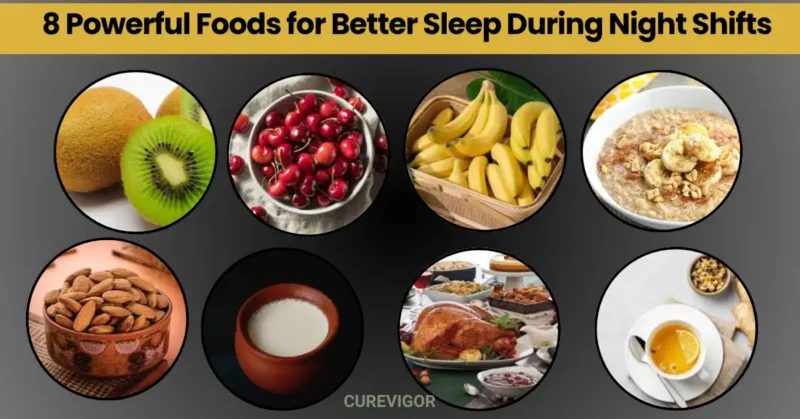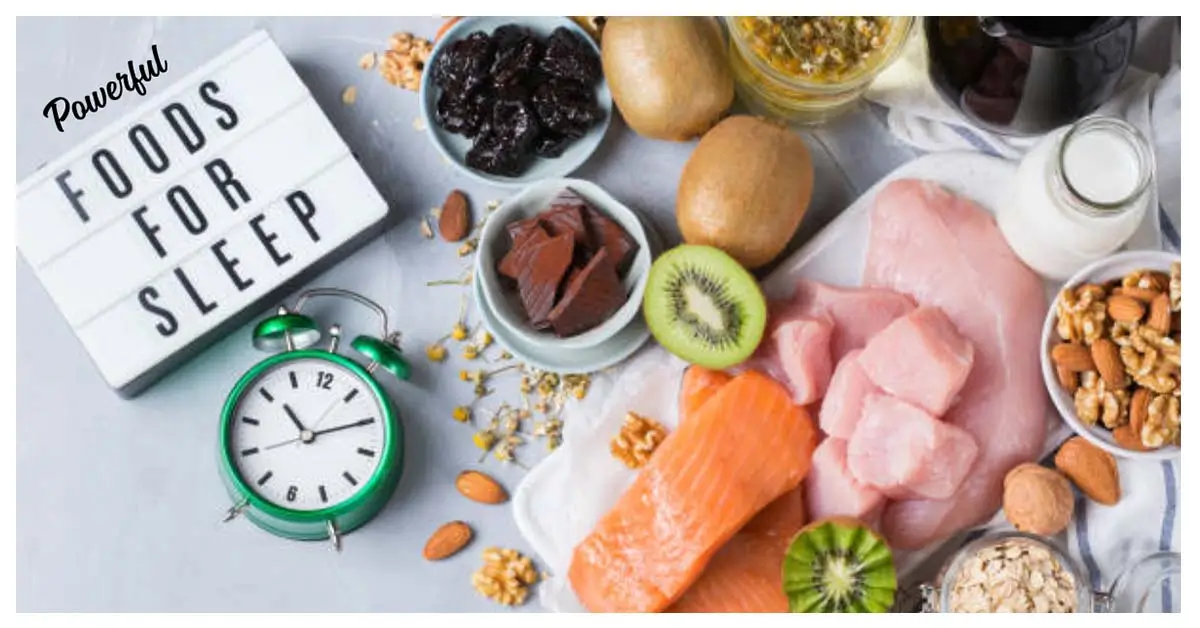Uncover 8 powerful foods for better sleep during night shifts. Improve melatonin levels, relax faster, and wake up more refreshed—naturally.
Thank you for reading this post, don't forget to subscribe!Working night shifts can throw your sleep into chaos—but what you eat might help reset your rhythm. In this guide, we reveal 8 powerful foods for better sleep, backed by science and tailored for shift workers. These aren’t just snacks—they’re nutritional tools that support melatonin production, muscle relaxation, and faster sleep onset, even in broad daylight.
What food helps you sleep after a night shift?
After a night shift, focus on powerful foods rich in tryptophan, magnesium, and melatonin, which support relaxation and the production of sleep hormones. Great choices include kiwi, tart cherries, bananas, almonds, and oatmeal. These help calm the nervous system and prepare the body for rest. Avoid caffeine, spicy foods, or anything high in sugar. A light meal with a complex carb and a calming herbal tea (like chamomile) can help. Eating about 30–60 minutes before sleep works best. Keep portions small to avoid digestive issues.

Why Night Shift Sleep Needs More Than Just Darkness
If you work the night shift, you already know how hard it is to fall asleep when the world is just waking up. While blackout curtains and white noise machines can help, many overlook a crucial factor: what you eat. Certain powerful foods can either calm your nervous system and help your body produce melatonin, or they can stimulate your brain and disrupt your sleep cycle completely.
In this guide, we’ll explore eight powerful foods that don’t just fill your stomach—they help you fall asleep faster, stay asleep longer, and wake up more refreshed, even when you’re sleeping during the day.
1. Kiwi: A Natural Sleep Promoter for Shift Workers
Kiwi may be one of the most effective natural sleep aids in the fruit world. This small, green fruit is rich in antioxidants like vitamins C and E, serotonin precursors, and folate—all of which contribute to better sleep regulation.
According to a study conducted by Taipei Medical University, people who consumed two kiwis one hour before bedtime fell asleep 42% faster and slept more soundly. For night shift workers, eating kiwi as part of your post-shift wind-down meal can naturally trigger your body to start winding down. It’s light, easy on the stomach, and helps you transition from alert to restful more smoothly.
2. Tart Cherries: A Sleep-Supporting Superfruit
Tart cherries, especially in juice form, have been shown to increase melatonin levels in the body. Melatonin is a hormone that regulates your sleep-wake cycle—exactly what gets disrupted when you’re working nights.
Research published in the European Journal of Nutrition found that participants who drank tart cherry juice twice daily experienced longer sleep duration and improved sleep efficiency. For shift workers, drinking a small glass of unsweetened tart cherry juice upon arrival home (around 7–8 a.m.) may help support a smoother transition into restful sleep, especially when combined with a calming bedtime routine.
3. Bananas: Magnesium and Potassium for Muscle Relaxation
Bananas are more than a convenient snack—they’re rich in magnesium and potassium, two essential minerals that relax muscles and support your nervous system. They also contain vitamin B6, which plays a role in the production of melatonin.
Eating a banana before bed can help prevent muscle cramps and twitching that often interrupt sleep. For shift workers who experience body tension after long hours of standing or moving, bananas offer a quick and affordable way to promote physical relaxation before sleep sets in.
4. Oatmeal: A Comforting Carb that Calms
A small bowl of oatmeal can do more than warm you up. It’s a source of complex carbohydrates, which raise insulin levels slightly and help tryptophan (a sleep-promoting amino acid) enter the brain. Oats also contain a bit of melatonin and magnesium naturally.
Unlike sugary cereals, oatmeal stabilizes blood sugar and doesn’t cause an energy spike. Add in a splash of almond milk and a sprinkle of flaxseeds or sliced bananas, and you have a bedtime-friendly meal that supports hormonal balance and satiety.

5. Almonds: A Magnesium-Rich Sleep Snack
Almonds are rich in magnesium, a vital nutrient for relaxing the body and regulating melatonin levels. A study published in the Journal of Research in Medical Sciences found that magnesium supplementation improved sleep onset and duration in older adults with insomnia.
For night shift workers, eating a small handful of raw, unsalted almonds about 30 minutes before bed can provide healthy fats and the mineral support your nervous system needs to wind down effectively. They’re also blood-sugar friendly, helping to reduce overnight awakenings due to glucose dips.
6. Warm Milk: A Classic with a Scientific Backing
Warm milk isn’t just an old wives’ tale—it has science on its side. It contains both tryptophan and calcium, which work together to produce melatonin in the brain. Calcium helps the brain utilize tryptophan efficiently to make this essential sleep hormone.
Drinking a small cup of warm milk before bed can act as a gentle sedative, especially for night workers transitioning from a mentally active shift to a more relaxed home environment. If you’re dairy-sensitive, consider fortified non-dairy alternatives, such as oat or soy milk, which also contain magnesium and added B vitamins.
7. Turkey: A Protein-Rich Source of Tryptophan
Turkey is famously associated with post-meal drowsiness, and that’s thanks to its high levels of tryptophan—a key amino acid involved in the creation of serotonin and melatonin. For night shift workers, including a small portion of lean turkey in your post-shift meal may support relaxation and improve sleep onset.
It’s important not to overeat protein right before bed, though. A light turkey sandwich on whole-grain bread or a few slices of turkey with steamed vegetables makes for a sleep-supporting, low-glycemic final meal of the day.
8. Herbal Teas (Chamomile, Lemon Balm, Valerian): Natural Relaxants
Herbal teas are a gentle way to transition from the high-alert energy of your shift into a restful state of mind. Chamomile contains apigenin, an antioxidant that binds to brain receptors and induces sleepiness. Lemon balm and valerian root are also recognized for their ability to reduce anxiety and promote a sense of calm.
Avoid caffeinated teas, such as green or black tea, after your shift. Instead, opt for a caffeine-free herbal blend and savor it slowly in a dimly lit environment. The ritual of tea itself can signal to your brain that it’s time to unwind.
Final Thoughts on Powerful Foods for Better Sleep During Night Shifts
Night shift workers face enough challenges without adding poor sleep into the mix. What you eat plays a direct role in your ability to fall asleep during daylight hours, stay asleep long enough to recover, and wake up without feeling groggy or foggy.
Choosing powerful foods rich in melatonin, tryptophan, magnesium, and calming carbohydrates gives your body the tools it needs to rest, even when the sun is up. Whether it’s a bowl of oats, a cup of herbal tea, or a few tart cherries, small nutrition changes can result in significant sleep improvements.
Stay tuned for the follow-up post:
“8 Foods You Must Avoid for Better Sleep on the Night Shift”
It covers the hidden sleep disruptors to avoid during and after your shift.
FAQs on Powerful Foods for Better Sleep During Night Shifts
Q. What helps you sleep when you work the night shift?
The key to sleeping well after a night shift lies in creating a consistent sleep routine and supporting your body’s circadian rhythm. Use blackout curtains and white noise, and maintain a cool room temperature. Eat sleep-promoting powerful foods like oats or almonds before bed. Avoid screens, caffeine, and bright light during your commute home. Using blue-blocking glasses while heading home can also help. Stick to the same sleep and wake times—even on days off—for best results.
Q. What should you eat during the night shift?
During a night shift, eat balanced, energy-sustaining meals that won’t spike your blood sugar or disturb digestion. Include complex carbs, lean protein, and healthy fats. Good options include a quinoa salad with vegetables, a turkey sandwich on whole-grain whole-grain bread, or hummus with whole-grain crackers. Drink water steadily, and limit caffeine after 3 a.m. Eating small, frequent meals is more effective than consuming one large meal. Avoid sugary snacks and fried foods, as they can cause crashes and disrupt post-shift sleep.
Q. How do you stop falling asleep during the night shift?
To stay alert, eat small, energizing meals with protein and fiber throughout your shift. Use bright lighting at your workstation and take regular breaks to get up and move around. Caffeine can help if taken early in the change, but avoid it near the end. Staying hydrated and chewing sugar-free gum may also improve focus. Take a 20-minute nap during scheduled breaks to recharge. Keeping your mind stimulated—such as switching tasks or socializing—can also reduce drowsiness.
Q. Is the night shift unhealthy?
Working night shifts can increase the risk of sleep disorders, metabolic issues, and burnout due to chronic circadian disruption. However, the risks can be mitigated with healthy sleep habits, a balanced diet, and regular medical check-ups. Shift workers are more prone to weight gain, heart issues, and mental fatigue if self-care is neglected. Prioritizing consistent sleep, melatonin-friendly foods, and stress reduction techniques helps protect long-term health. It’s not inherently unhealthy—what matters is how you manage it.
Q. How to prepare sleep for a night shift?
Start by resetting your internal clock in small steps—delay bedtime by 1–2 hours a few days before your shift starts. On the day of your shift, take a 2–3 hour nap in the late afternoon or early evening. Keep your bedroom dark, calm, and quiet by using blackout curtains and a white noise machine. Avoid caffeine and alcohol beforehand. Create a wind-down routine, such as reading, stretching, or sipping herbal tea, to help you unwind. If needed, consider melatonin supplements, but use them only under the guidance of a medical professional.
Read more Health and Wellness Tips.
You might like:

